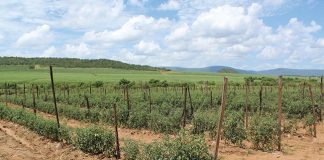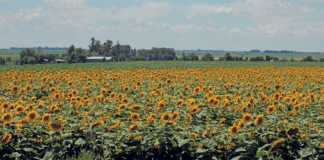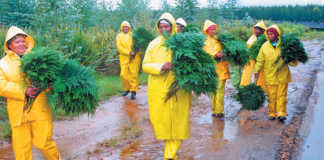Koos, who was born in the Paul Roux district 55 years ago, has had a passion for farming ever since he can remember. Growing up on the farm Mieliebult near Senekal, he began working at a young age as a farmhand.
He started by milking cows, progressed to working with beef cattle and later drove a tractor. He then qualified as a truck driver and learned welding and implement maintenance.
“My career in farming actually started when I was 26 years old and started to work for Frikkie du Preez on the farm where I grew up. He taught me the basics of commercial farming,” says Koos.
“My big break came when Frikkie encouraged and supported me to buy my own implements and become a contractor for other developing farmers in the district. This contracting work paid for the implements and put me on the path to become an independent farmer.”
Frikkie gives his side of the story: “Koos practically grew up on my farm. I am very proud of what he has achieved so far. This man has a talent for farming. Not anyone is Koos is the type of farmer we need in South Africa to make a success of land reform.”
Koos bought two tractors – a John Deere 3140 and a Massey Ferguson 265 – and several implements for his contracting work from Frikkie. He worked on contract for four years in Paul Roux, Senekal and Kaallaagte, after which he leased 55ha of land and planted maize.
His first harvest yielded 3t/ha. In 2007, he was offered the farm Astoria (524ha) by the then Department of Agriculture and Land Affairs, and is currently the caretaker farmer. “My situation is unclear. In the past, we were eligible for the title to the land if we maintained and farmed the land well, but the policy has since changed and it is unclear whether I will ever get the title to Astoria. We are now working on a lease system, but the details still need to be ironed out,” he explains.
Koos and his son Clifford, 22, plant 160ha to maize and sunflower, using Monsanto and Agricol Agsun seed cultivars on the deep, sandy loam lands. The maize is planted in three-feet, seven-feet rows at a density of 33 000 plants per hectare. Last season, their average maize harvest was 3-4t/ha and their average sunflower harvest was 1,8t/ha.
“The heavy rains of the past planting season really affected us badly,” says Koos. “Nearly 800mm of rain fell and we had to plant some lands three times. This cost money and impacted on the overall profitability of the business.
“We marketed our crops through VKB Agribusiness at an average price of R1 450/t for maize and R4 500/t for sunflower. Our input costs were about R4 000/ha for maize and R1 500/ha for sunflower.”
Clifford is the mechanic on Astoria and feels strongly about the maintenance of equipment. “We earn our livelihood through our implements and tractors and it makes sense to take the utmost care of them,” he points out. “We now own four tractors – two John Deere 3140s, a John Deere 44/40 and a Massey Ferguson 265. We also own a John Deere 960 combine harvester.”
Koos agrees, adding that if a planter is not calibrated correctly, it is as useless as an infertile bull among the cows. The Mthimkulu ’s herd of 40 Bonsmara-type commercial cattle is run on natural grazing. Weaners are sold at the local auctions and to feedlots. Koos’s long-term plan is to expand the cattle component of his enterprise.
“I’m looking for additional land, but prices are very high and I’ll have to plan very carefully before I buy anything,” he says. “Farming has taught me over the years is to be very wary of unnecessary debt! With debt, a farmer can easily find himself losing money, not earning it. Nevertheless, a business has to grow and I really need to increase the cattle component.
“We also run 33 SA Mutton Merino sheep, but theft has become such a huge problem that we now keep them for our own use only.” Koos ascribes much of his success to commercial farmer Frikkie du Preez, his mentor, Flip du Preez, and Grain SA’s Farmers’ Development Programme. Flip du Preez is a retired commercial farmer appointed by the provincial agriculture department as a mentor to developing farmers in Senekal.
“Flip has played a decisive role in my career as a farmer,” says Koos. “He is always ready to assist and visits us at least three times a week. His practical advice that comes from years of farming has been invaluable to us. “I wish more commercial farmers would be prepared to become mentors. They have a wealth of experience and knowledge to share with developing farmers. That is the sustainable way to put more developing farmers on the land.”
Flip calls Koos an example to both commercial and developing farmers, adding: “Koos knows what he wants. He is one of the neatest and most hardworking farmers I know. We work closely together and I help him to plan his farming practices. We are currently looking at ways of increasing the cattle component on Astoria.”
Grain SA’s provincial co-ordinator in Free State, SAJohan Kriel, maintains that Koos is a true custodian of the land. “He gets the job done and is known for his dedication and drive. It is also very positive that his son Clifford farms with him. We need young people who are truly interested in farming. The current farmers are getting older and we need the young ones to replace them,” he says.
Clifford completed a course in marketing management and agriculture before joining his father on the farm. He enthuses about the training opportunities offered by Grain SA. “We belong to the Senekal study group and have completed a number of courses so far – tractor maintenance, advanced maize production, advanced sunflower production and resources and farm management,” he says.
Contact Koos Mthimkulu on 083 595 2741.
Caption:
Koos runs a herd of 40 Bonsmara-type commercial cattle, and plans to increase this number shortly.
COURTESY OF GRAIN SA













